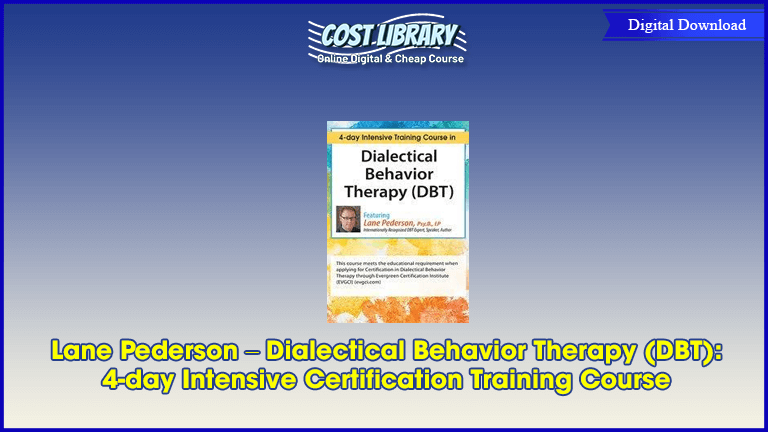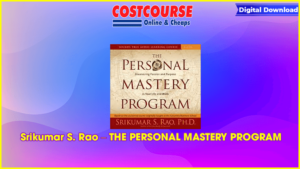Faculty:
Lane Pederson
Duration:
24 Hours 5 Minutes
Format:
Audio and Video
Copyright:
Nov 04, 2019
Description
Dialectical Behavior Therapy (DBT) has evolved from the go-to treatment for borderline personality disorder to one of the most recognized and sought after therapies for a variety of difficult to treat client problems.
Lane Pederson – Dialectical Behavior Therapy (DBT): 4-day Intensive Certification Training Course
The increasing pressure to adopt treatments that work makes DBT skills and strategies a must-have for all types of therapists.
For those who feel that pressure but fear becoming a “manual manicâ€, relax. Dr. Lane Pederson teaches how to follow the manual yet make thoughtful customizations consistent with evidence-based practices and always grounded in the therapeutic alliance. Covering DBT from theory to clinical application, including the use of diary cards, behavioral analysis, contingency management, and multi-layered validation, this course recording welcomes those implementing DBT in standard and adapted ways as well as those wishing to simply add DBT skills and techniques to their eclectic or integrative style.
If you have felt limited or stuck with your therapy skills or ready to give up on certain clients, this course will breathe new life into your work. You will leave ready to use the essentials of DBT listed above as well as skills from the Mindfulness, Distress Tolerance, Emotion Regulation, and Interpersonal Effectiveness Modules with your clients, enjoying new confidence in and effectiveness with your clinical skill set.
You’ll be amazed at the difference you’ll see in your clients and the confidence you’ll gain in your practice.
PS… You’ll learn so much more than just DBT techniques in this training! You’ll learn to effectively utilize DBT in yourpractice and transform your patient outcomes.
Imagine the relief your clients will experience with this effective, break-through treatment.
Imagine the satisfaction you will feel knowing that your clients’ transformation stems from effective DBT training,skill development, and practice.
Imagine the confidence you will have when treating even your most challenging clients.
It’s time to begin the journey. . . and this intensive training is your first step.
Become Certified in Dialectical Behavior Therapy! This training meets the educational requirements when applying to become Certified in Dialectical Behavior Therapy (C-DBT) through Evergreen Certifications! Learn more about Certification at (www.evergreencertifications.com/CDBT)
Lane Pederson Psy.D, LP, is not affiliated or associated with Marsha M. Linehan, PhD, ABPP, or her organizations.
Handouts
Manual – DBT 4-Day Intensive Training Course (5.6 MB)
116 Pages
Available after Purchase
DBT Intensive Handouts (7.10 MB)
74 Pages
Available after Purchase
Outline
Foundations of DBT
The Story of DBT
Explicit focus on validation
Cognitive-behavioral change strategies
Skills training
Consultative approach
Mindfulness
Dialectical balance
Five functions of DBT
Is it DBT?: What’s needed in a DBT clinical process
Dialectical Philosophy. What IS it, and HOW is it Used?
Dialectics explained
Dialectical assumptions
Dialectics in action
Dialectical Abstinence. When NOT to be dialectical
Core Assumptions of DBT: Shaping the Therapy
Acceptance and nonjudgmental stance
View of clients, therapist and therapy
DBT Models: Standard and Beyond
DBT Modes and Formats
DBT Research: Understanding and Context
Evidence-Based Practice versus
Evidence-Based Treatments
Understanding how therapy works
Six decades of empirical research
Maximizing therapeutic factors, DBT-style
Biosocial Theory: Guiding the Therapy
Biosocial theory of difficulties
How theory drives therapy
Update to Theory: RO DBT
Getting Started: Therapy Structure
Structure as a therapeutic factor
Structuring the environment
DBT Stages
Identifying treatment targets: suicidality, self-injurious behavior (SIB), therapy-interfering behavior (TIB), and other targets
Special Populations and Settings
Children and Adolescents
Substance Use Disorders
Levels of Care
Mindfulness and DBT
Mindfulness explained
Mindfulness of the approach
Mindfulness as a therapy technique
Mindfulness in life
DBT Skills Training
Integrating skills into therapy
Using skills to develop new behaviors
Methods for skills training
Mindfulness: The Path to Wise Mind
What skills: observe describe, participate
How skills: nonjudgmental, one-mindful, effectively
Mindfulness practice and application
Teaching Dialectics
Identify dialectical dilemmas
Activate Wise Mind action
For adolescents and parents: Middle path
For substance use disorders: dialectical abstinence
Distress Tolerance
Wise mind ACCEPTS
IMPROVE the moment
Pros and cons
Radical acceptance/turning the mind
Emotion Regulation
Model of emotions
PLEASED
Build positive experiences
Opposite action
Interpersonal Effectiveness
FAST skills
GIVE skills
DEAR MAN skills
Supplemental and Updated Skills and Modules
Urge surfing
Bridge burning
TIP
DBT Clinical Process
Diary Cards
Standard
Adapted for special populations
Behavioral Analysis (Chain Analysis)
Getting the client on board
Build awareness and options
Bridging into solution analysis
Starting Out: Commitment Strategies Validation
A multi-layered approach
As an exposure technique
Used dialectically with change
Difference from normalization
Change Interventions
Behavioral principals
Contingency procedures
Best behavior change methods
DBT-style cognitive interventions
Exposure Techniques
When to use (and not to use)
Exposure protocols
Alternatives to exposure
Communication Styles
Reciprocal
Irreverent
Consultative Group and Treatment Teams
Increase your motivation
Develop effective responses
Qualities of effective treatment teams
Assess and Manage Self-Injurious Behavior (SIB)
When is SIB life-threatening?
Creating alternatives
Assess and Manage Suicidal Ideation (SI)
Suicide assessment techniques
Establishing safety protocols
Safety plans and safety commitments
Hospitalization Issues
Effective use of the hospital
Transitions in and out
Next Steps
What you learned and what you need
Developing your plan
Taking action
Faculty
Lane Pederson, Psy.D, LP Related seminars and products: 16
Consultation and Therapy
Lane Pederson Psy.D, LP, has provided Dialectical Behavior Therapy (DBT) training and consultation to over 10,000 professionals in the United States, Australia, South Africa, Dubai, Canada, and Mexico through his training and consultation company, Lane Pederson and Associates, LLC (www.DrLanePederson.com). A real world practitioner, Dr. Pederson co-owns Mental Health Systems, PC (MHS), one of the largest DBT-specialized practices in the United States with four clinic locations in Minnesota (www.mhs-dbt.com). At MHS Dr. Pederson has developed DBT programs for adolescents, adults, people with dual disorders, and people with developmental disabilities. He has served as clinical and training directors, has directed practice-based clinical outcome studies, and has overseen the care of thousands of clients in need of intensive outpatient services.
Dr. Pederson’s DBT publications include The Expanded Dialectical Behavior Therapy Skills Training Manual, 2nd Edition: DBT for Self-Help and Individual & Group Treatment Settings (PESI, 2017); Dialectical Behavior Therapy: A Contemporary Guide for Practitioners (Wiley, 2015); Dialectical Behavior Therapy Skills Training for Integrated Dual Disorder Treatment Settings (PESI, 2013) and The DBT Deck for Clients and Therapists: 101 Mindful Practices to Manage Distress, Regulate Emotions & Build Better Relationships (PESI, 2019).
Notable organizations he has trained for include Walter Reed National Military Hospital, the Federal Bureau of Prisons, the Ontario Psychological Association, the Omid Foundation, and Psychotherapy Networker. He has provided DBT training for community mental health agencies, chemical dependency treatment centers, hospital and residential care settings, and to therapists in forensic settings. Dr. Pederson also co-owns Acacia Therapy and Health Training (www.AcaciaTraining.co.za) in South Africa. Dr. Pederson currently serves on the advisory board for the doctorial counseling program at Saint Mary’s University of Minnesota and is a peer reviewer for Forensic Scholars Today.
Lane Pederson is not affiliated or associated with Marsha M. Linehan, PhD, ABPP, or her organization.
Speaker Disclosures:
Financial: Lane Pederson maintains a private practice. He is an author for PESI Publishing & Media and receives royalties. Dr. Pederson receives a speaking honorarium from PESI, Inc.
Non-financial: Lane Pederson has no relevant non-financial relationship to disclose.








